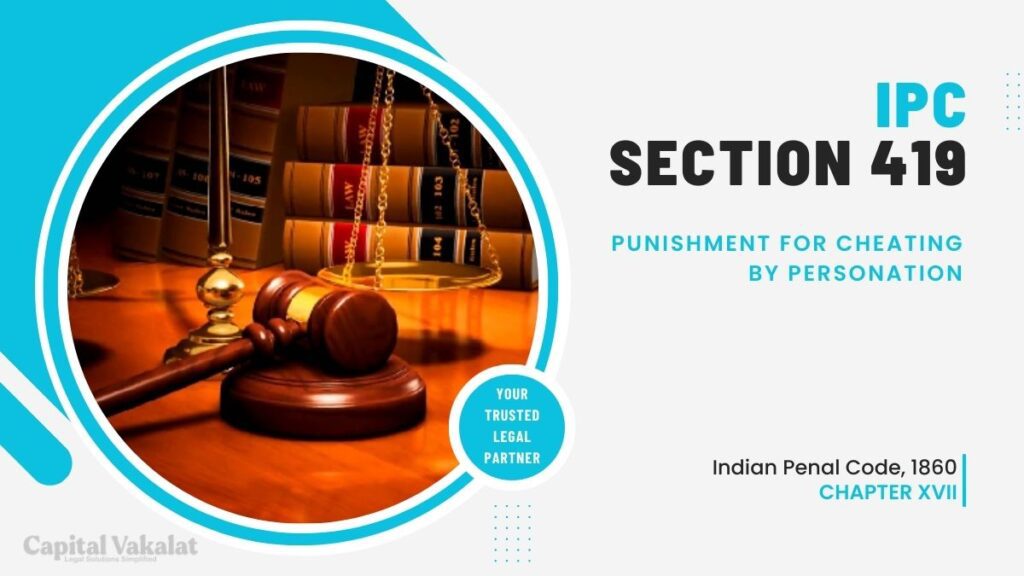In a world where deceit lurks around every corner, legal frameworks stand as stalwart guardians against unscrupulous practices. One such legal provision, section 419 ipc:Punishment for cheating by personation, is a beacon of justice aimed at curbing fraud through impersonation.

In this article, we embark on a journey through the intricacies of this section, peeling back its layers to reveal the consequences awaiting those who dare to deceive.
The Anatomy of Section 419 IPC
What’s the Deal with section 419 ipc?
Before we plunge headfirst into the consequences, let’s get cozy with section 419 ipc. This section, nestled within the Indian Penal Code, is no wallflower. It boldly declares that anyone who cheats by personation shall dance to a legal tune. Now, what’s this ‘personation’ jazz, you ask? It’s not just putting on a disguise for Halloween; it’s about pretending to be someone you’re not to pull the wool over someone’s eyes, leading to a wrongful gain or loss.
Unmasking the Perpetrator: Who’s the Culprit?
So, who’s the star of this legal drama? The culprit in section 419 ipc:Punishment for cheating by personation is the one who, with deceptive intentions, assumes a false identity. It’s not just about wearing a snazzy wig and fake mustache; it’s about adopting another’s persona for deceitful gains. The law takes a dim view of such shenanigans, and rightfully so!
The Legal Sledgehammer: What’s at Stake?
Now, let’s talk consequences! Section 419 ipc doesn’t play games. If you get caught cheating by personation, you’re looking at some serious repercussions. Brace yourself for imprisonment that can stretch up to three years, or a fine, or both! That’s not a slap on the wrist; it’s a legal haymaker that packs a punch.
Real-world Ramifications: Tales from the Trenches
Scam Stories: A Walk on the Wild Side
Ever wondered how section 419 ipc:Punishment for cheating by personation plays out in the real world? Let’s dive into some scam stories that would make your grandma clutch her pearls! From fraudulent job interviews to fake identities on social media, the web of deception is spun far and wide. Section 419 ipc is the spider waiting to catch these cunning flies.
Behind the Scenes: Investigating Impersonation
What happens when the long arm of the law catches wind of personation mischief? Investigations kick into high gear! Law enforcement becomes the Sherlock Holmes of the legal realm, piecing together clues, interviewing witnesses, and exposing the impersonator’s web of lies. It’s a cat-and-mouse game, and section 419 ipc is the legal mousetrap.
Conclusion
As we wrap up our expedition into the labyrinth of section 419 ipc:Punishment for cheating by personation, one thing is evident – the law takes impersonation seriously. It’s not just a legal provision; it’s a shield against those who seek to deceive and defraud. So, whether you’re tempted to assume a false identity for personal gain or just for kicks, remember: section 419 ipc is watching, and it doesn’t play nice with impersonators. The consequences are real, and the legal sledgehammer is poised to strike!
Frequently Asked Questions
What if I Didn’t Gain Anything from Personation?
Sorry, no free passes here. Whether you bagged a hefty sum or your scam fell flat, section 419 ipc:Punishment for cheating by personation applies. The law cares about the intent and the act, not just the loot.
How Does the Court Decide the Severity of Punishment?
The court isn’t flipping a coin to decide your fate. It considers factors like the extent of deception, the impact on the victim, and your history of mischief-making. So, the severity of your punishment is no game of chance.
Can I Plead Ignorance to Escape Punishment?
Ignorance isn’t bliss in the eyes of the law. Claiming you didn’t know personation was a big deal won’t cut it. Section 419 ipc:Punishment for cheating by personation is crystal clear, and the law assumes you’re in the know.